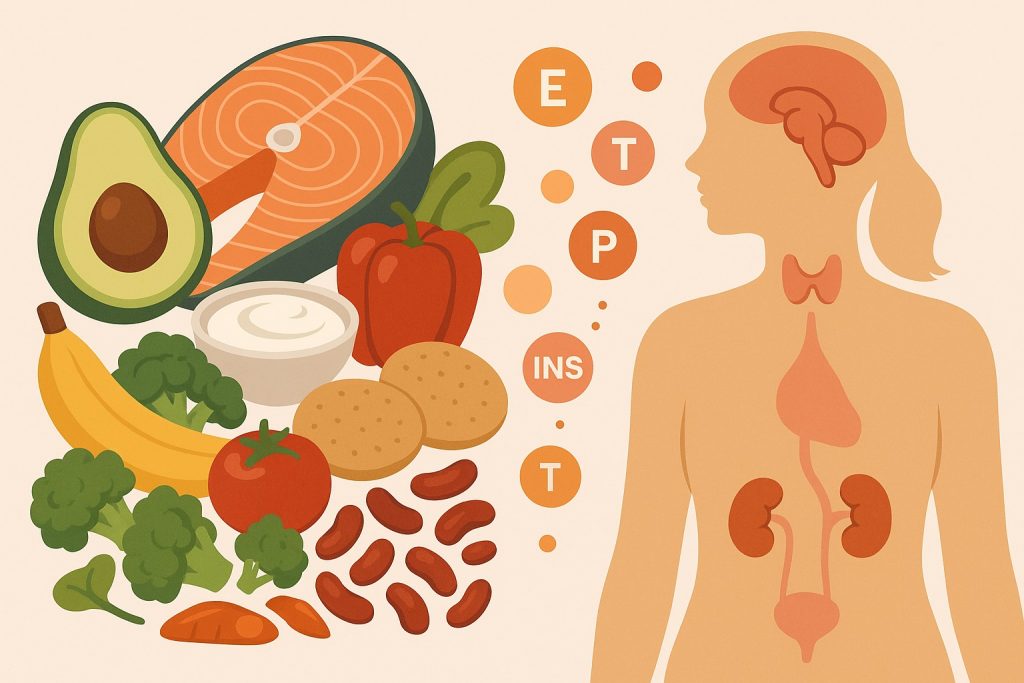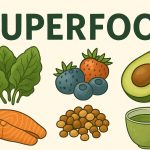Hormones are the body’s chemical messengers—they regulate everything from mood, energy, metabolism, and fertility to sleep and immune function. And one of the most powerful, yet overlooked influences on hormonal health is nutrition. What we eat directly impacts the production, activity, and balance of hormones in our body.
The Link Between Diet and Hormones
Our endocrine system is highly sensitive to nutrients, blood sugar levels, and inflammation—all of which are influenced by our diet. A well-balanced, nutrient-rich diet supports optimal hormone function, while poor dietary habits can lead to imbalances that manifest as fatigue, weight gain, anxiety, skin problems, or reproductive issues.
Key Ways Diet Affects Hormones
- Blood Sugar and Insulin
- High sugar and refined carbohydrate intake causes insulin spikes, contributing to insulin resistance—a condition that underlies type 2 diabetes, polycystic ovary syndrome (PCOS), and other metabolic disorders.
- Stable blood sugar helps regulate mood-related hormones like cortisol and serotonin.
- Fats and Sex Hormones
- Healthy fats (like omega-3 fatty acids) are essential for the production of estrogen, progesterone, and testosterone.
- Trans fats and excessive omega-6 fats (common in processed foods) can promote inflammation and disrupt hormone signaling.
- Protein and Growth Hormones
- Dietary protein provides amino acids needed to produce growth hormone, insulin-like growth factor 1 (IGF-1), and thyroid hormones.
- Fiber and Estrogen Balance
- Fiber helps the body excrete excess estrogen through the digestive tract, reducing the risk of estrogen dominance—a common issue linked to PMS, fibroids, and breast cancer.
- Micronutrients and Hormonal Regulation
- Magnesium, zinc, selenium, vitamin D, and B vitamins are vital for hormone synthesis, conversion, and receptor sensitivity.
- Deficiencies in these nutrients may lead to imbalances in thyroid, adrenal, and sex hormones.
Foods That Support Hormonal Health
Include:
- Leafy greens, berries, cruciferous vegetables (e.g., broccoli, kale)
- Nuts, seeds (especially flax and pumpkin)
- Whole grains (quinoa, oats)
- Wild-caught fish, eggs, legumes
- Fermented foods (yogurt, kefir, sauerkraut)
- Healthy fats (olive oil, avocado, fatty fish)
Limit or avoid:
- Refined sugars and flours
- Processed meats and junk food
- Artificial sweeteners and preservatives
- Alcohol and excessive caffeine
Signs Your Hormones May Be Out of Balance
- Chronic fatigue or low energy
- Mood swings, anxiety, or depression
- Irregular menstrual cycles or infertility
- Unexplained weight gain or difficulty losing weight
- Poor sleep or night sweats
- Skin issues like acne or dryness
If these symptoms persist, dietary changes combined with medical consultation may be necessary.
Glossary
- Endocrine system – The system of glands that produce hormones*
- Insulin resistance – A condition where cells stop responding well to insulin*
- Estrogen dominance – An imbalance where estrogen levels are too high relative to progesterone*
- Omega-3 – A type of healthy fat that supports brain and hormonal health*
Conclusion
Nutrition plays a central role in hormonal harmony. By choosing whole, nutrient-rich foods and minimizing inflammatory and processed items, you can support your body’s natural balance. A healthy hormonal system leads to better physical health, mental clarity, and emotional resilience.


